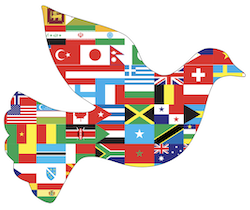News
News
Maria Montessori: A Champion of Peace Education

Maria Montessori, known for scientifically studying the needs of children and matching education to their developmental stages, is also credited for envisioning the education of children as the path to world peace. She realized that the way we approach teaching can have a lasting impact on how children interact as humans throughout their lives. Montessori lived through two wars, a global pandemic and colonialization, making it clear to her that “Establishing lasting peace is the work of education; all politics can do is keep us out of war.”
Believing a key to the betterment of society was early childhood education, Montessori made peace education a focus of her students’ introduction to the world. Respect is woven into every aspect of the classroom, beginning with the respect teachers show students and carrying over to the expectation that all beings and materials are due respect.
Dr. Montessori addressed the United Nations urging world leaders to value global citizenship, personal responsibility, and respect for diversity as vital parts of education. These values were as important to her as math, language and the sciences. Montessori education focuses on developing the whole child., Empathy and global mindedness are natural outcomes of her method, and critical thinking is developed via each lesson presented to and repeated by the children. You can see these ideas in Springmont’s classrooms. Primary students learn about other countries using the puzzle maps and the geography folders. Not only are they able to locate far off countries, but the folders show pictures of these peoples conducting their lives. What do they eat? Where do they live? Children begin to see how their lives are similar to those living elsewhere. Elementary children have opportunities to research and imagine what life might have been like for past civilizations, to honor their contributions, and to critically examine periods of history.
Springmont students also have opportunities to wonder and pursue knowledge, whether student-initiated or guided by a teacher. Montessori children are not taught what to think but how to seek information and answers. The greatest outcome of this kind of learning is that children learn to contemplate big ideas and use critical thinking when encountering new ideas. One of our alumni alluded to this at last Thursday’s Alumni Panel. When asked about how he reflects on his Montessori education given the current political climate, his answer spoke to his ability to look critically at information meant to mislead or manipulate. The habit of thinking and discerning, when learned at a young age, serves children now and through adulthood.
The foundation of Montessori’s peace education is found in how children and adults handle conflict at school. Having an environment focused on peace education does not mean there is an absence of conflict. It means conflicts are seen as opportunities for developing compassion, relationships, and a deeper understanding of another’s point of view. Children all have needs that have to be met, and in Springmont’s classrooms, those needs may be in conflict with the needs of another or the whole group. Learning to see yourself as part of a larger community is sometimes difficult. When there is a conflict between children, the parties are brought together, and each is offered a chance to speak his/her truth. The teacher is there to assist students in communicating thoroughly and politely and to help them understand the perspectives of others. If possible, suggestions for how to resolve the situation so both parties are satisfied are offered. Eventually, students are able to independently see situations from another’s point of view. This process, when supported by caring adults, creates the kind of citizens that effect change, see the richness of humanity, and crave peace.
"Peace is what every human being is craving for, and it can be brought about by humanity through the child."
-Maria Montessori


today
1 day ago